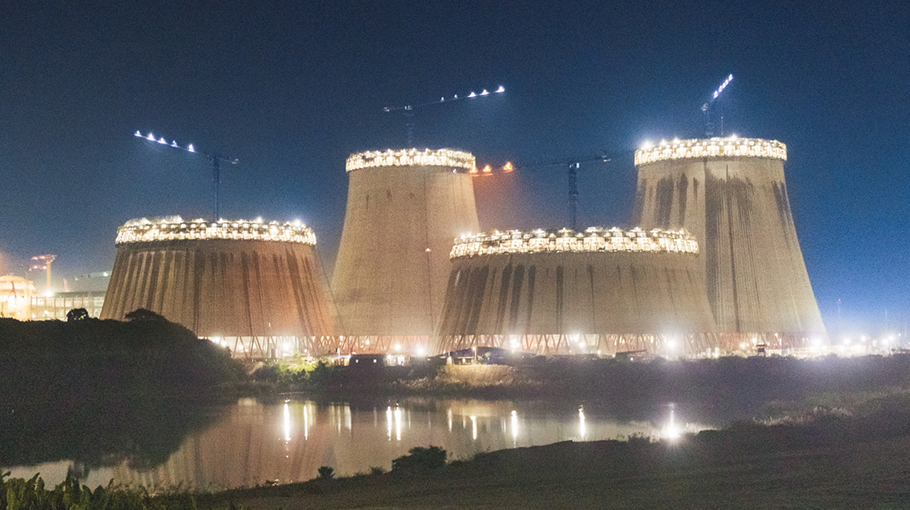RNPP uranium handover today
Hasina, Putin to join handover ceremony virtually

Bangladesh will receive Uranium for Rooppur Nuclear Power Plant (RNPP) today (Thursday). Russian President Vladimir Putin will formally handover Uranium to Bangladesh Prime Minister Sheikh Hasina.
Both the leaders will virtually join the handover ceremony.
With the handover ceremony, Bangladesh will be the 33rd member of the Global Nuclear Club.
Director General of the International Atomic Energy Agency (IAEA) Rafael Grossi will also attend the event virtually while Director General of ROSATOM, Russian Federation Alexei Likhachev will be present at Rooppur site.
Science and Technology Affairs Minister Yeafesh Osman on Wednesday said that the RNPP will contribute two percent to the gross domestic product (GDP) of Bangladesh and it will help change the economic scenario of Bangladesh.
While talking to the media at the RNPP site on Wednesday, Yeafesh Osman also said that it would take about one and a half years to commission the first unit of the 2400 MW RNPP.
He also said power generation trial will start after all the transmission lines and other infrastructures are ready.
“We hope we can commission the first unit of the RNPP in the next one and a half years,” he said.
A Nuclear expert who had been working in Russia for years and now working with the project said at least six more consignments of Uranium will arrive in Bangladesh in the next 15 years.
As the preservation of Uranium is highly risky, it will come by installments to Bangladesh as its consumption for the project, he said.
Talking about the start of the RNPP operation, its Project Director Dr Shawkat Akbar said the first unit of the RNPP will come into operation by September next year.
Science and Technology Secretary Md Ali Hossain said Bangladesh is going to be 33rd Nuclear power-using country in the world in the perspective of uranium handing over and receiving ceremony as part of the government's commitment to ensure energy security in the country.
The first consignment of nuclear fuel for RNPP reached Bangladesh by a special flight on September 28 and it was shifted to RNPP site on September 29.
According to the project details, the government expects to commission the first unit of RNPP in September, 2024 and the second one in mid-2025.
There are 30,000 people, including 7,000 professionals, working on the project. The project is expected to operate for 60-80 years.
Sources said RNPP will be able to take Bangladesh to unique heights by entering the nuclear club as it will also be able to play a leading role in meeting carbon emission reduction targets. At the same time, it will reduce the cost of power generation in a flash.
The project layout said the RNPP will generate 2,400 MW of electricity everyday and ensure global initiative of reducing carbon emission.
ROSATOM, as a Russian contractor, is involved in the construction of the RNPP, which consists of two units with 1,200 megawatts capacity each.
The Atomic Energy Commission, under the ministry, is implementing the RNPP project. The Russian contractor Atomstroyexport is constructing two 1200 MW units under the project. The nuclear fuel is being produced by Rosatom's associate company TVEL Fuel. Various countries around the world purchase nuclear fuel from them.
According to the World Nuclear Association website, the countries using nuclear energy include the US, China, France, Russia, South Korea, Canada, Ukraine, Germany, Japan, Spain, Sweden, Belgium, UK, India, Czech Republic, Finland, Switzerland, Bulgaria, Pakistan, Hungary, Slovakia, Brazil, South Africa, Mexico, Romania, Argentina, United Arab Emirates, Belarus, Slovenia, the Netherlands, Iran and Armenia.
Once the nuclear fuel is loaded into the power plant's reactors, power can be produced for one year. After that, the fuel will have to be reloaded into the reactor.
In October 2021, Rooppur unit-1 was almost completed, with the placement of the reactor within the unit's structure. It was set up in accordance with the IAEA standards.
The reactor is the main component of a nuclear power plant. The second unit's reactor was set up in October last year.
According to the ministry, in 2013, during Prime Minister Sheikh Hasina's visit to Russia, a loan agreement for the RNPP project was signed.




